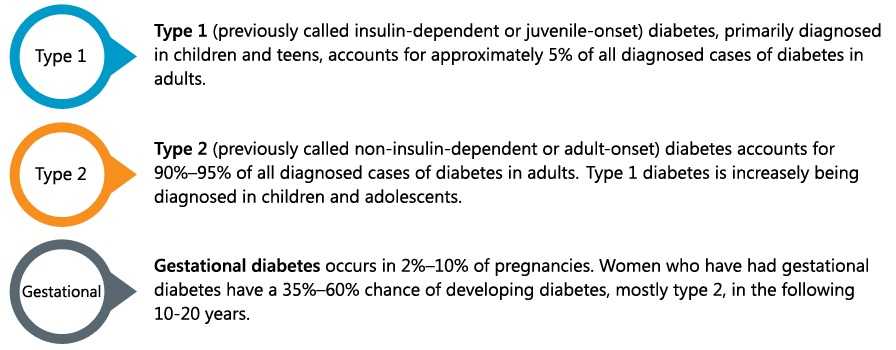What is Diabetes?
Diabetes is a disease in which blood glucose levels are above normal.
Most of the food we eat is turned into glucose, or sugar, for our bodies to use for energy. The pancreas, an organ that is located near the stomach, makes a hormone called insulin to help glucose get into the cells of our bodies. When people have diabetes, their bodies either do not make enough insulin or cannot use insulin as well as they should. When this happens, glucose builds up in the blood.
High blood sugar levels can lead to fatigue, excessive thirst and urination, more infections and slower healing, and can lead to heart disease, stroke, eye problems including blindness, nerve damage and loss of limbs, kidney problems, and gum disease leading to tooth loss.
The three main types of diabetes:

Prediabetes: In addition to these three types of diabetes more than 79 million Americans aged 20 years or older have a prediabetes. Prediabetes is a condition in which individuals have blood glucose levels higher than normal but not high enough to be classified as diabetes. People with prediabetes have an increased risk of developing type 2 diabetes, heart disease, and stroke. Unfortunately the development of prediabetes and its complications hits hard during the working years.
Diabetes can lead to serious complications and premature death, but people with diabetes can take steps to control the disease and lower the risk of complications. Managing diabetes is possible with proper medical care, support, and motivation.
Learning more about diabetes prevention and management is simple. The National Diabetes Education Program (NDEP), a joint program from CDC and NIH, offers many evidenced based materials that are free for use by your company. NDEP Diabetes HealthSense provides more information regarding diabetes prevention and management. Additional tools are available from the American Diabetes Association and the Diabetes Self-Care a Web site sponsored by the American Association of Diabetes Educators.
Aids & Tools
Know More
- Learn more about diabetes from the National Diabetes Education Program
- More information about diabetes can be found from the Centers for Disease Control and Prevention.
- Additional resources and information can be found from the American Diabetes Association.
- The American Association of Diabetes Educators has numerous resources about diabetes.
Ask More
- How can I start increasing diabetes awareness in my small business?
Answer:
Check out the resources and ideas in the Right Fit section of this website.
- Many of our employees have diabetes and are eager to know more, what can I do?
Answer:
The Diabetes at Work Web site contains many ideas about things you can do no matter how big or small your company is or the amount of money you have to commit. Check out the ideas under "BUILD"
- I think that supervisors and managers in my company don't understand diabetes and think it limits employee performance - how can I educate them?
Answer:
There are so many misconceptions about diabetes and your supervisors are not alone. You can help them understand diabetes better by inviting a local health care professional with advanced knowledge of diabetes including physicians, endocrinologists, nurse practitioners, dietitians or Certified Diabetes Educators (found at local hospitals or by visiting AADE's FIND AN EDUCATOR site) to speak with them and provide a presentation.
Do More
-
- Keep senior management apprised of diabetes trend data in your workplace and how your company can lower health care costs and absenteeism by implementing strategies found on the Diabetes at Work Web site. Implementation resources can be found on the BUILD page.
- Offer the Understanding Diabetes session during a support group or lunch and learn activity.
- Offer activities and events during Healthy Aging Month (September). Resources can be found at NDEP/HEALTHY AGING MONTH. Scroll down on the page until you come to "September 2014".
- Hispanic/Latino information
- African American African Ancestry Resources
- Asian Americans, Native Hawaiians and Pacific Islanders Resources
- Page last reviewed: December 29, 2016
- Page last updated: December 29, 2016
- Content source:
- Maintained By:


 ShareCompartir
ShareCompartir